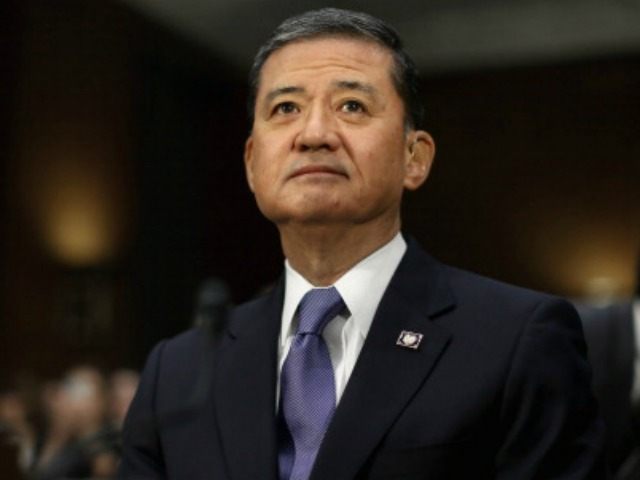It’s interesting how some stories just sort of drop off the media radar screen, especially when they’re disastrous for the Obama Administration. Remember when the “secret death list” scandal at the Department of Veterans Affairs became the biggest story in America a year ago?
Big Media was told the story was basically over after VA Secretary Eric Shinseki resigned, after a long period of resistance, because Obama doesn’t like to admit failure or risk provoking high officials into spilling the beans by sacking them. Promises of reform were made. The news cycle rolled on to other things, over the protestations of veterans groups who doubted anything would really change.
It’s a year later. Nobody ever really got fired over the VA debacle. And while we’re hopefully past the business of supervisors cooking the books to collect performance bonuses, according to the New York Times, the waiting lists are worse than ever:
The number of veterans on waiting lists of one month or more is now 50 percent higher than it was during the height of last year’s problems, department officials say. The department is also facing a nearly $3 billion budget shortfall, which could affect care for many veterans.
The agency is considering furloughs, hiring freezes and other significant moves to reduce the gap. A proposal to address a shortage of funds for one drug — a new, more effective but more costly hepatitis C treatment — by possibly rationing new treatments among veterans and excluding certain patients who have advanced terminal diseases or suffer from a “persistent vegetative state or advanced dementia” is stirring bitter debate inside the department.
Agency officials expect to petition Congress this week to allow them to shift money into programs running short of cash. But that may place them at odds with Republican lawmakers who object to removing funds from a new program intended to allow certain veterans on waiting lists and in rural areas to choose taxpayer-paid care from private doctors outside the department’s health system.
At the risk of sounding excessively cynical – is it possible to be excessively cynical about a department with the VA’s history? – some of what follows sounds like a bureaucratic defensive play against that program to get veterans help outside the system. The very first element in a bureaucracy’s immune-system reflex against reform is to decry every change as excessively costly. We see that every time ObamaCare repeal is scored as fabulously expensive, even though we were assured the program would be revenue-neutral going in.
Also, as Breitbart News reported this weekend, the VA is undergoing tough congressional scrutiny at the moment. Efforts to pin blame for the Department’s situation on Congress cannot help seeming opportunistic, especially since that’s every Administration agency’s go-to excuse for its troubles. Take a nickel away from this $3.5 trillion government, and every department suddenly becomes unable to address its core responsibilities.
But let us take it as a given that the Department of Veterans Affairs needs more funding, even after bureaucratic bloat and fiscal mismanagement are addressed. The question is: Why is this such a stunning surprise? Veterans are coming home from deployments in Iraq and Afghanistan, which are surely sources of the increased demand for prosthetic limbs described by the New York Times. The department acts completely flummoxed by a surge in demand that should have been broadly predictable. That doesn’t exactly make the system appear wise and carefully managed.
It’s also difficult to trust what the VA says about itself, given that the heart of last year’s big scandal involved managers creating secret lists of veterans to ignore so they could whip up reports of stellar performance and short wait times to make themselves look better. Since there wasn’t much of a housecleaning after the scandal, we’re being asked to take it on faith that the system has reformed itself, largely under the stewardship of the very same people who either facilitated or failed to detect the death-list scandal.
Also, if the system isn’t capable of producing enough doctor-hours to address the needs of veterans, what alternative is there, besides the outside-the-box Choice Card program Republican lawmakers advocate? The disturbing parallels between the VA system and ObamaCare illustrate a nation slipping deeper into the grip of bureaucratic failure, seduced by promises central planners can’t keep. We need more health care, in both the civilian and military sectors, but we’ve been manipulated into accepting systems guaranteed to reduce the supply.
Big Government wastes billions of dollars on foolish and corrupt endeavors, then uses its failure to address core missions as leverage to demand even more money from us. Health care for our veterans should have been one of our very highest priorities, for a very long time. Instead, it’s a perpetual crisis, and we have good reason to fear it will be exploited by the “never let a crisis go to waste” types.

COMMENTS
Please let us know if you're having issues with commenting.